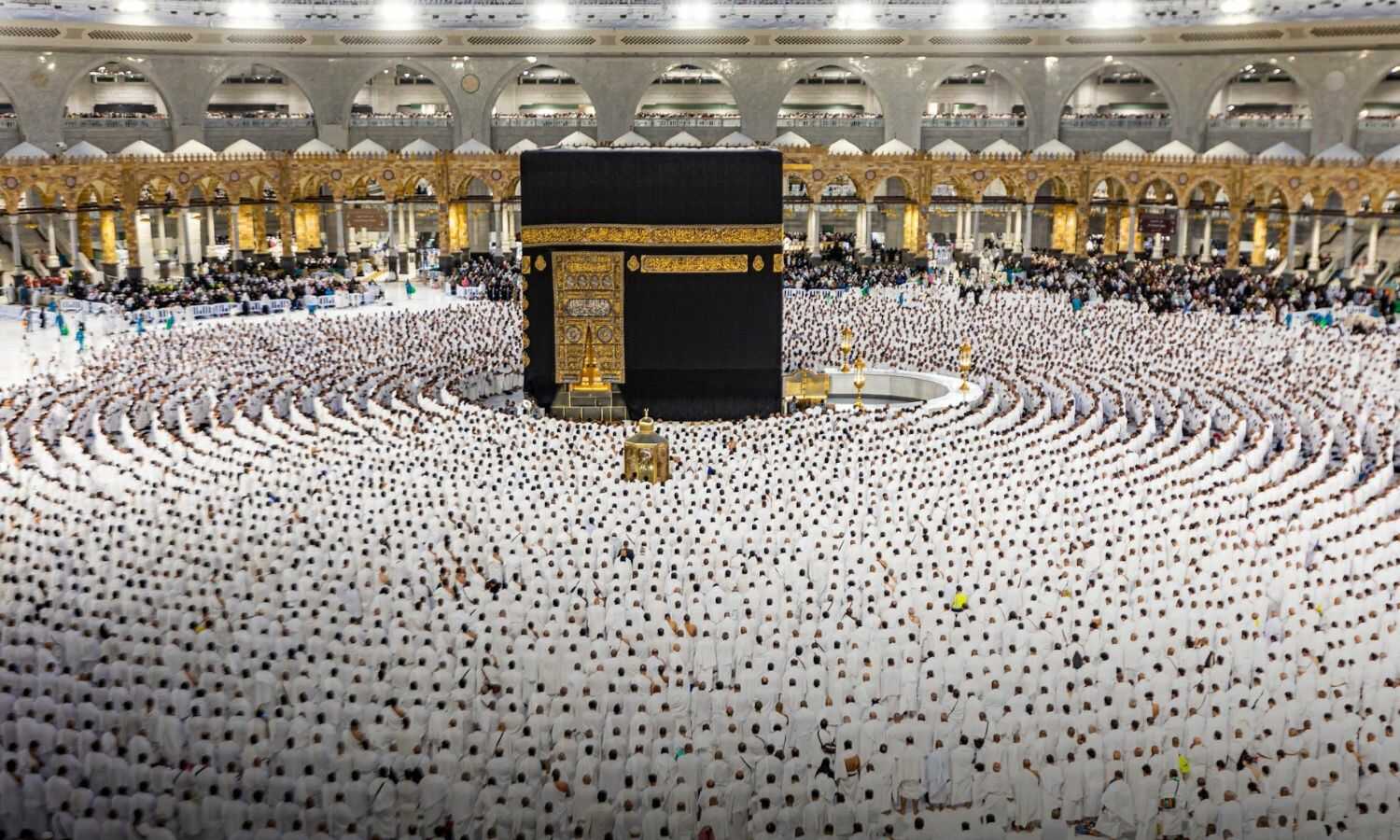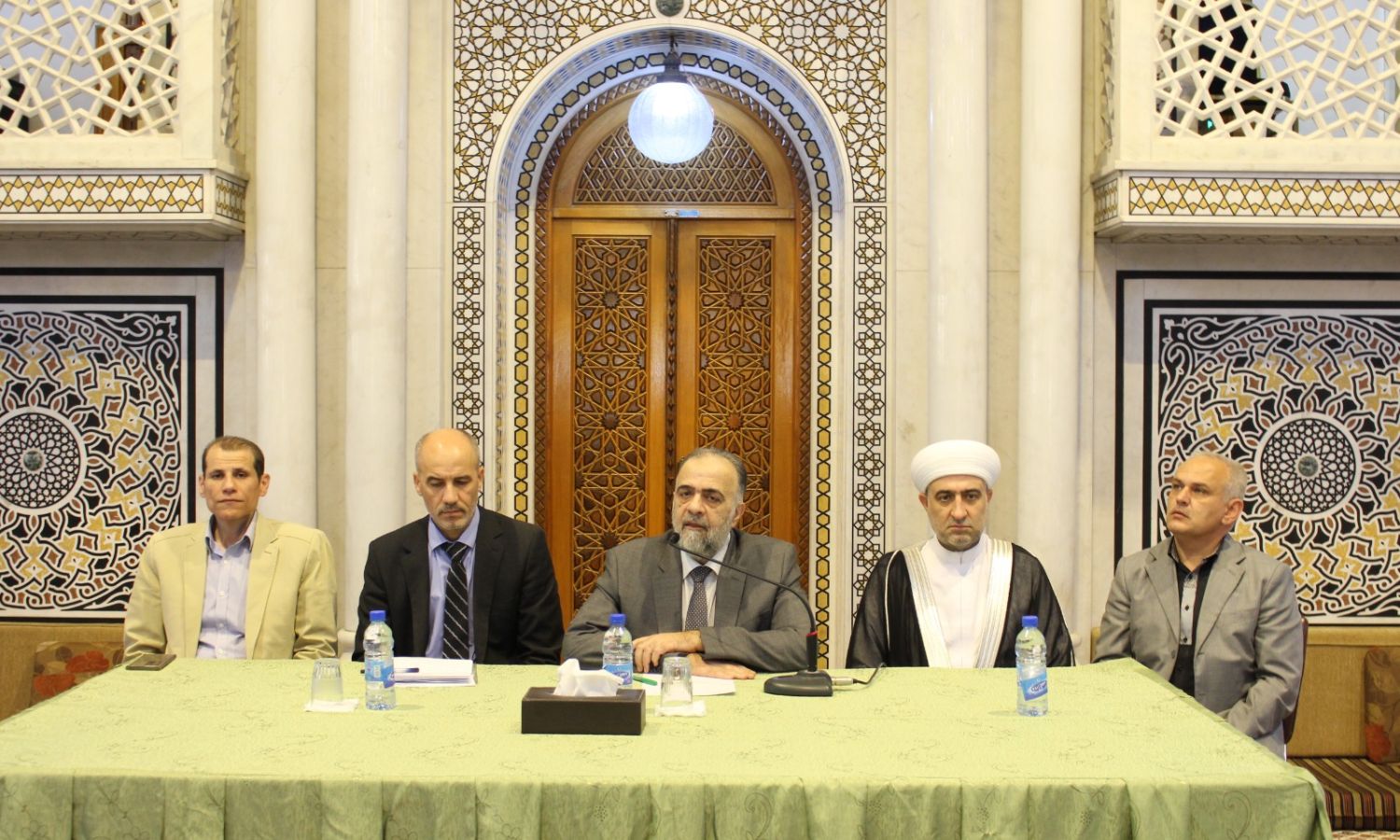



In its first participation in the Hajj season in 12 years, the Syrian regime has directed efforts to commercialize the season. This is evident through the requirement of payments in US dollars, and mandating pilgrims who refuse to participate to exchange the Syrian pound back to dollars—a process that entails fees for both buying and selling.
The Ministry of Awqaf (Religious Endowments) in the regime’s government opened registration for the Hajj season between April 1 and 9. On the 16th of the same month, the Minister of Awqaf, Mohammad Abdul-Sattar al-Sayyed, announced the acceptance of the required number of pilgrims, reaching 17,500 out of more than 50,000 applicants.
On the same day, the Central Bank of Syria (CBS) issued a decision obliging those wishing to perform Hajj upon approval from the Awqaf to settle the service dues related to the performance of Hajj in foreign currency (referring to the US dollar).
According to the decision, the deposit of foreign currency in the account specified by the Ministry of Awqaf for this purpose at Al Baraka Bank Syria across all its branches is required, with the account management being compelled to provide the bank with a list of pilgrims who have settled the fees, and the final statement balance of the deposit operations, along with documents proving the payment of the balance to the Saudi Ministry of Hajj account. Additionally, there is the need to state the operations of refunding the amounts paid in foreign currency to those who abstain from performing Hajj, within no more than ten days of the end of the Hajj rituals.

The Minister of Awqaf in the regime’s government, Mohammad Abdul-Sattar al-Sayyed, meets with the heads of the Hajj groups, secretaries of the Hajj groups, and religious guides for the Hajj season — April 16, 2024 (Ministry of Awqaf/Facebook)
The Central Bank’s decision permits public exchange companies to sell a part or the entire amount in foreign currency to Syrian citizens and those legally treated as such who have obtained Hajj approval, as per the exchange and remittance bulletin on the date of the sale, with an added commission not exceeding 10% of the applied bulletin price. The amount is to be delivered to the buyer in cash for depositing in the account specified by the Awqaf Ministry.
In addition to the required proof documents for the sale completion, exchange companies are obligated to supply the bank with data on the sales operations within two business days of the end of the month in which the sales occurred under this decision.
Furthermore, the Central Bank obliges those who abstain from performing Hajj rites and have bought foreign currency from exchange companies to return the purchased amounts to the company from which they bought, according to the exchange rate at the date of the resale, under penalty of legal accountability.
Exchange companies are bound to pay a settlement compensation of 10,000 Syrian pounds for each day of delay in submitting the required data, and another 100,000 Syrian pounds for each deficiency in one of the necessary documents that must be retained.
On its part, the Minister of Tourism approved all requests from offices specializing in Hajj and Umrah, which met the conditions required by both the Ministries of Awqaf and Tourism, to serve those wishing to travel via these offices.
The local newspaper Al-Watan reported on April 16 that the cost of performing Hajj for 14 days starts from 85 million Syrian pounds (5,882 US dollars, considering the dollar equals 14,450 pounds according to the S-P Today website), and can go up to 200 million (13,840 US dollars), depending on the services provided to the pilgrim, including all round-trip expenses.
Dr. Firas Shaabo, who holds a doctorate in financial and banking sciences, explained to Enab Baladi that the regime charging Hajj fees in US dollars is expected given its inability to secure foreign currency for people and essential needs; it wouldn’t provide what perhaps it considers non-essential needs that do not affect the authority’s survival without benefiting somehow from the Hajj file as a “token of Arab normalization with Damascus.”
Shaabo stated that the dollar fee demand is not surprising, as booking a flight ticket is done in dollars, and those going on Hajj realize they will pay in hard currency in an uncertain situation regarding the ability of remittance and exchange offices to sell dollars to citizens, in his opinion.
The economic expert sees that many pilgrims might resort to securing foreign currency from their personal resources or the black market, away from the direct intervention of the government, given the restrictions and tightening imposed on the sale of dollars.
According to Shaabo, the Syrian regime does not benefit directly from this operation, but individuals close to and influential within the regime will profit. Even if these entities charge additional fees and are able to collect up to a thousand US dollars from each pilgrim, the total amount could reach approximately 17 million dollars, which are significant numbers if beneficiaries are individuals, but do not support or contribute to the stability and recovery of countries. For this reason, the regime operates on an individualistic principle, to divide the profits among several individuals, unless one of the regime’s pillars completely controls the operation, without any positive impact on the Syrian treasury.
“The regime has opened the door to sell foreign currency to those wishing to perform Hajj to avoid causing a state of panic and demand for hard currency in the markets, and to claim that it is obliged or committed to secure it. However, in reality, there will be no rapid security for these requirements.”
Firas Shaabo – Doctor of Financial and Banking Sciences
The Syrian Committee for Hajj and Umrah, one of the opposition institutions, manages the pilgrim groups from northern Syria, Turkey, Qatar, and Erbil, while for the first time in 12 years, the regime manages the groups from Damascus and the rest of the world.
The Syrian Hajj Committee set the registration fees at the offices of Bab al-Hawa, Bab al-Salam, Tal Abyad, Reyhanli, and Gaziantep at 4,600 US dollars per person, while in Istanbul and Erbil, the fee is 4,800 dollars per person.
In Qatar, the registration fee per person amounts to 5,200 US dollars.
The variation in registration fees is due to differences in the prices of flight bookings, provided that the total amount is paid at the official Syrian Hajj Committee’s offices with a receipt issued from their offices, noting that the amount does not include the value of the sacrifice of an animal, nor does it cover the pilgrim’s transportation from their home to the airport or to the land borders for both departure and return.
if you think the article contain wrong information or you have additional details Send Correction